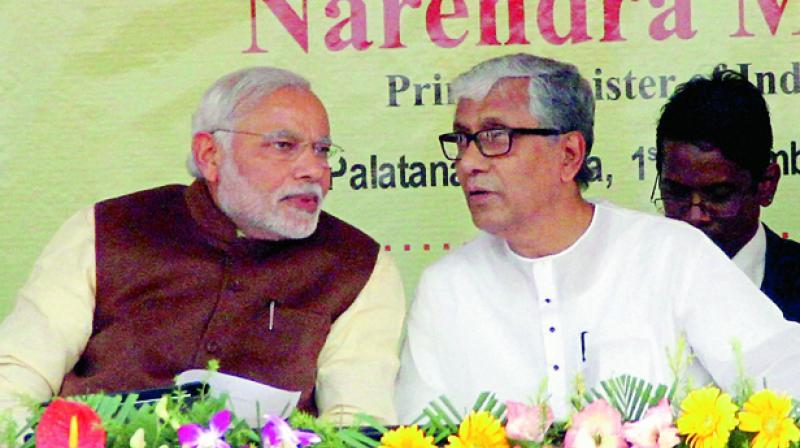Manik Sarkar to Modi Sarkar: BJP 1, Left 0 in first direct face-off in India

Agartala: In the first direct face-off between the Left Front and the BJP in India’s electoral politics, the Left has lost.
The BJP and ally Indigenous People's Front of Tripura (IPFT) ended the Left’s 25-year rule in Tripura with a massive victory, 43 of the 59 seats counted on Saturday. The combine was up all 43 seats this time as it had not even opened its tally in 2013. BJP alone got 34.
Manik Sarkar, the country’s poorest chief minister, managed to get 16 seats in the state, down 33 from 2013’s 49. Sarkar has ruled the state for 20 of the 25 years his party has been in power.
The Congress drew a blank, down all 10 from 2013.
Polling was cancelled in one constituency in the 60-seat Assembly after the death of a CPI(M) candidate a week before the February 18 election.
Here are a few facts that show the magnitude of the BJP’s victory in Tripura.
In 2013, the party had got less than two per cent of the vote share. Fifty nine of its 60 candidates had lost their deposits and the party hardly had any organisation or leadership in the state. The Left’s main rival was the Congress.
So, what brought about this tremendous BJP victory? That would be Prime Minister Narendra Modi’s burgeoning image and popularity since 2014, the party’s syncretic and inclusive political strategy with tribals, appropriating leaders from other parties and, not to mention, a no-holds-barred campaign.
Of Tripura’s 60 Assembly seats, 20 belong to the tribals. The Left had won 19 in 2013. In its inclusive strategy this time, the BJP created its own tribal cadre base by appointing two tribal vice-presidents, four tribals in the 12-member core committee, and also several others in tertiary organisations.
It also focussed on the local royal hero, the last king of the Manikya dynasty (1280 – 1947) Bir Bikram Kishore Deb Burman and observed his 110th birth anniversary on a grand scale. PM Modi had also tweeted how “his rich contribution towards the development of Tripura can never be forgotten”. There was also talk of giving him a Bharat Ratna and naming a road in Delhi after him.
On the other hand, the Left Front has always portrayed royals as crafty and exploitative. That didn't go down well this time at the face of renewed focus, by none other than the Centre, on the Manikyas' place in the state's history.
Then the BJP allied with the key tribal outfit (IPFT) headed by Narendra Deb Burman. Two Narendras emerged as a combination that could deliver tribal angst into substantive nurturing.
Also Read: NE poll results: BJP set to take Tripura; Cong-BJP tug-of-war in Meghalaya
The BJP also chipped away at Manik Sarkar’s major strength -- the Bengali community. Targetting the many Bengalis in government employment, the BJP promised to implement the Seventh Pay Commission that would substantially hike their pay. Tripura government employees are still on the Fourth Pay Commission.
While the party itself lacked a strong leading face – former gym instructor Biplab Dev being the only familiar face – it imported leaders from other parties. Several Congress-turned-Trinamool leaders joined the party, and grassroots-level organisation got a boost.
Also, the party sent 42,000 workers, one each for 60 voters, to swing electorate sentiment.
Next came the blitzy campaign with the Prime Minister, party chief Amit Shah and senior leaders Rajnath Singh, Smriti Irani etc holding rallies across the state. Modi had repeatedly campaigned for HIRA (which means ‘diamond’ as opposed to ‘manik’ which means gem) -- H for highway, I for Internet way, R for roadways and A for airways instead of Manik (the Left CM’s first name).
The sorriest figure in Tripura today though one with the most distinguished career is Manik Sarkar. He became an MLA for the first time in 1980 at 31. He was appointed chief whip of the CPI(M) around the same time. He won again in 1983 and in 1993, when the Left Front came to power, Sarkar was appointed state secretary of the CPI(M). He became chief minister in 1998 at age 49. He was in power ever since.
What didn't work in his favour? Charges of corruption, lack of development and an aspirational yet disgruntled youth.
Tripura is awash with saffron today. BJP leader Ram Madhav said the result was a historic verdict. He said: “People have voted for poriborton (change), they have accepted our slogan of 'Chalo Paltai (let's change)."

